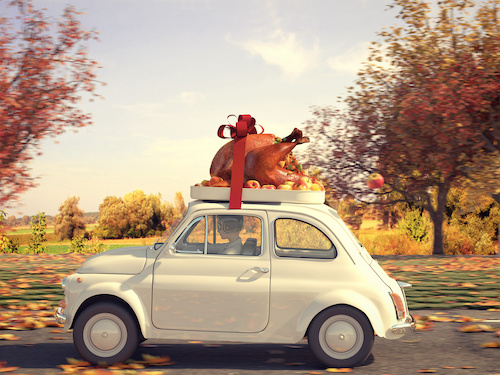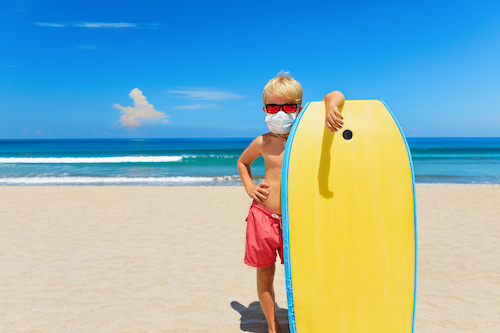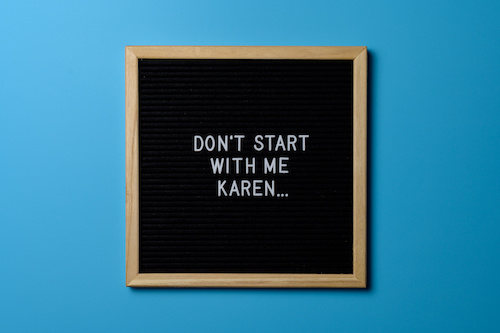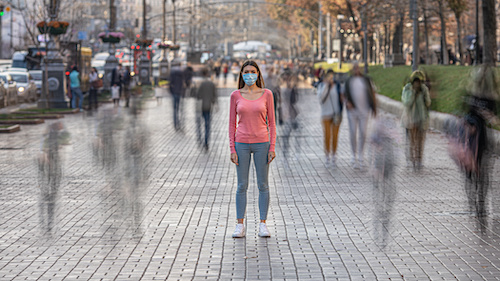Or – how Karen is fighting to run the COVID-19 show.
Every year, in the lead up to Christmas, I hear people talk, obsess, and incessantly grumble about Christmas. For a supposedly joyful time, Christmas, for many people, seems to be The Thing many people feel many difficult emotions about (other than joy), and yet, Christmas is something they cannot envisage going without. Well, not at least in the traditional ways they have always ‘done’ it.
In the year 2020, at the time of COVID-19, the same issue, with a slight twist, reared its head in public and private conversations.
This time, I heard an added focus on exceptions and exemptions. Since COVID-19 became a worldwide reality, we have all had to grapple with, whenever listening to discussions about restrictions that might be put in place to help stop the spread of the infection (such as numbers in attendance at places of worship, social distancing, or mandatory masks), I have heard various folk argue passionately for exceptions and exemptions to the proposed rules.
Individuals and politicians alike have claimed that some people/groups should be granted an exemption from having to comply with the restrictions we have all been living to contain the spread of COVID-19. This is DESPITE the fact that we have seen both here and overseas how quickly we can see a change in infection numbers – from zero to rapidly climbing numbers.
Certainly, some of the religious groups and their members have consistently seen themselves as ‘special and different’, and therefore entitled to be exempt from being expected to be held to the restrictions that we have found to effectively contain the spread. They have opposed the closing of mass gatherings (well, theirs), opposed physical distancing, and opposed requests for people to wear masks.
By the time Christmas reared its head, the narrative included the ‘special occasion’ argument, despite the fact this seems irrelevant when we are discussing a pandemic.
Somehow, the context of a Pandemic seemed to either be ignored in favour of privileging the special occasion narrative, or some groups viewing themselves as “special and different” – and therefore somehow not bound by the same rules and expectations. In short, a Karen.

Together at Special Times – no matter the cost
Prior to Australia’s own preparations for Christmas, I watched and tracked America’s and Canada’s ways of dealing with Thanksgiving in their respective countries. Over there, Thanksgiving is their version of our Christmas, so I figured I’d take a look at what happened, and how they approached the reality of the world being in the grip of a pandemic.
Sure enough, both nations got in the grips of the ‘but surely we should make an exception for this at THIS time’ argument, focusing on THIS time meaning Thanksgiving, seemingly paying only lip service to the context of COVID-19. The Pandemic. Reports showed that people travelled back to families, held large family gatherings, mostly didn’t wear masks – regardless of health warnings.
People spoke as though the traditional celebration overrode any need to prioritise anything else (such as public health). People spoke of how hard things had been with restrictions for months, and how the celebration was some sort of necessary morale boost for the nation.
In the press and on social media, people were up in arms over any attempt on the part of government authorities to suggest restrictions on numbers at gatherings and travel, suggestions of social distancing, and warnings about such gatherings potentially leading to a further explosion of the pandemic numbers. In the US particularly, the narrative focused on peoples’ so-called ‘rights’ to do what they please – regardless of the potential risk to others. Karens everywhere.

In the news from the US and Canada, I watched in horror as politicians there went on in the same odd, apologetic manner as ours about how they didn’t want to impact on people’s Thanksgiving plans. Neither the US nor the Canadian governments insisted people engage in a serious health-oriented set of plans around Thanksgiving, and ‘allowances’ were made. Predictably, the number of people who contracted the disease went up.
Initially, those against strict restrictions to contain the spread of COVID-19 tried to say it was debatable whether Thanksgiving could be said to have had a significant effect on numbers. The data today is clear and undeniable. In Canada, Thanksgiving was held on the 12th of October 2020; both the number of cases and the number of deaths went up after Thanksgiving and since [i]. Dr Laura Rosella, an epidemiologist at the university of Toronto, commented in the aftermath that the increases in infections in Canada clearly showed the impact of Thanksgiving as the numbers rose in the two weeks after the holiday, corresponding with the incubation period for the virus. She also observed that the increase in numbers in Canada was despite the fact that it was harder for people to get tested around this time due to logistics issues and pressure on resources, so numbers may actually be higher[ii].
Similarly, in the US, where Thanksgiving was held on 26 November 2020, COVID-19 deniers were very strident, and the lobby for making an exception for Thanksgiving was very strong.
Baruch Fischhoff, a Carnegie Mellon University psychologist who writes about COVID-19 risk analysis and communications, considers that a number of factors are at play in making the US citizenry deal with COVID-19 in the manner they do. He suggests these include – people underestimate the risk to themselves and their families; a significant proportion (I suggest, influenced by the 45th President himself and his entourage, social media and partisan interests pushed in the media) doubt what health officials tell them about the virus and its severity; others are just plain irresponsible. Fischhoff suggests that other factors, at the State and National level, set the stage for the disaster that followed Thanksgiving. Factors he named included, lack of a cohesive national pandemic strategy (he should have said the ruling Federal administration in office disbanding the pandemic team they inherited and refusing to implement the pandemic plan that had been developed prior to their taking office by the previous administration), patchwork and seemingly arbitrary restrictions at the State and local level; and ineffective, politicised and contradictory public health messaging sowed confusion and mistrust [iii].
I would add at least five other factors that I think also played a major part, and continue to hinder the effective tackling of the virus worldwide:
- the destructive ongoing undermining effect of partisan interests promoting a virus-denying / minimising stance on social media and through Murdoch-controlled media, whilst actively undermining those scientists calling for strong and decisive action to contain the virus
- the promotion by the 45 administration of a narrative of ‘the economy at all costs’ over and above the health and safety of the people, and the refusal by that administration to step in and take steps to try to contain the spread through effective public measures
- the introduction of the idea of ‘alternative facts’ and ‘fake news’ by the 45 administration. This has damaged and undermined people’s ability to discern real from fiction and meant that constructive and authoritative discourse is constantly derailed by people claiming they have done their so-called ‘research’, claiming the right to question and challenge solid science, and being given platforms to do so on the basis of so-called freedom of speech. And claiming the right to have whatever position they want to push given an equal footing to real and fact-based information. The damage of this particular factor is immeasurable and will likely be felt for decades more to come, as it has undermined trust in public authorities and experts’ input. We see this same factor at play in the arena of climate change and climate change denial
- the persistent focus in the last thirty years since Reagan on individual rights over and above any concern for the wellbeing of others. A focus on individual rights with no regard for responsibilities. A focus on the individual over the ecology they exist in and depend upon, is completely at odds with the reality of living in a society where we are all interdependent
- the silo and polarising effect of social media – this has enabled both the spread of disinformation about the virus and health measures, and undermined public confidence in the experts and authorities, and creates silos of interest groups and like-minded ghettos, reinforcing peoples’ confidence in their own views, polarising groups rather than facilitating true debate and making it hard for people to discern what is accurate information, and what is disinformation or propaganda.
Ultimately, the numbers confirm what health experts tried to warn about: higher death and infection rates, post-Thanksgiving.
“But it’s different here” – the Australian picture of denial

Here in Australia, we have a Federal government in power backed by the influence and push of the Murdoch media, and many of the factors I named above about how the US and Canada came to have so much trouble with COVID-19 play out here as well. We’re not that different to the US and Canada. We need to be vigilant about these issues and address them if we want to avoid ending up with our version of what happened in the US.
As we approached Christmas 2020, or for that matter, prior to that, that other religious holiday, The Melbourne Cup[iv], and later, Sydney’s New Year’s Eve fireworks, we, as a nation, largely tried to act as though there were no lessons to be learnt from other countries.
Throughout 2020, those Premiers who tried to stand up for strict restrictions to contain the spread were subjected to outrageous and unrelenting pressure, ridicule, name-calling, threats, disinformation, and undermining, both by senior politicians and by the Murdoch hounds[v]. They still are.
In New South Wales, the State Premier insisted the Fireworks go ahead despite health authorities insisting they should be cancelled[vi].
In the middle of a pandemic where, at a moment’s notice, we have witnessed areas go from zero transmissions to rising numbers of COVID-19-affected people, I heard politicians in the media ramble on about how they understand it’s ‘hard for people, especially at this (Christmas) time’, to follow advisable health precautions. Imagine if we heard anyone make the same claim for it being ‘hard’ for people to follow drink driving rules at Christmas time?!! Yet, somehow, the argument stood.
I sat in amazement hearing that, just because Christmas was coming, (or the Melbourne Cup before that, or the NYE Fire Works), politicians felt the need to apologise for continuing to ask the community to take responsibility and accept that a pandemic requires a re-ordering of priorities.
Almost every time I heard a politician speak in the media in December 2020, in the lead up to Christmas and the New Year’s Eve Fireworks display in Sydney, I was reminded of anxious parents with children in stores at this time. In a desperate bid to avert a meltdown and a public showdown with the attendant loss of face, they looked to me like many parents do when they showcase their impotence with their kids. Across the board, I saw a distinct lack of true leadership. From the PM down, we heard mixed messages, asinine comments about this special time and families, and baseless justifications for loosening restrictions ‘at this time’.
Politicians accepted that people should travel, borders should open between States, and restrictions were loosened on how many people could gather, over the age of 12. The complicated nature of the suggested restrictions here in Australia was laugh out loud funny, at times, as politicians strived to look like they were minding the health risks of Christmas gatherings becoming super spreader events, while pandering to the acontextual whining of those voices pushing for special dispensation and business as usual. Check out Jimmy Rees, an ABC host on FB and his take on COVID-19 restrictions/guidelines[vii].
I witnessed the media privilege the voices of whiny adults who moan on about how upset they are at how this is going to impact on their Christmas – as though having the kind of party one wants to have, with the number of people in attendance one wants, is a right and not a privilege.
I didn’t hear anything like the same space being accorded to the voices pointing out that perhaps peoples’ right to not be infected and to have their health and safety matter more than the issue of people ‘suffering’ over not being able to ‘do’ Christmas the way they traditionally do.
But then, as I write this, I see that our PM made a public statement about the first fleet sailors coming over to Australia in 1788 having it tough, privileging the suffering of this group for comment, over any mention about the suffering those invaders inflicted on the Aboriginal traditional owners they met and systematically killed from the time of their arrival in Australia. So, I went looking for the data about our numbers over the lead in to, and after the Christmas/New Year period; once again, the numbers show an upwards swing, though, thankfully, not as dramatic as in the US and in Canada:
It can’t be business as normal – it’s a pandemic
Call me strange but, when we have a currently relatively unknown, highly communicable disease, which, while not killing most people it affects, leaves many with untold ongoing physical ailments in post-viral syndrome, often for months, how many people we can have at our gathering does not really seem to me to be The Thing we ought to be preoccupied about.

Here in Australia, while I understand that people would like things to be ‘normal’ and for them to be able to attend their usual gatherings and have their usual feasting and celebrations (for those who can afford them), I don’t understand how that could possibly be more important than acting in the best interests of looking after each other’s health and wellbeing. In my sourer moments, I’ve been known to tell people: if you want a Christmas gathering with as many of your dear ones around the table in the future, then how about attending to what you can do right now to try to prevent any more people getting sick, and some of them dying?
Invoking privilege and special exemptions – even in a pandemic
So, I decided to compile a list of the reasons that I’ve heard people bandy about as to why we ‘should’ lift restrictions on the number of people we can have at public and private gatherings, the request to wear face masks in public places, the need to track where people go in order to facilitate contact trace should new infections arise.
Here are some of the most popular I found –
- our economy depends on us keeping on keeping on with business as usual – somehow, making money and keeping money coming in is more of a priority than saving lives and protecting people’s wellbeing. This has been a particularly strong position for the LNP governments at all levels, both State and Federal;
- we’re a Church. Somehow, being a church seems to be seen by some as grounds for waiving restrictions. And yet, it seems their god has not discriminated – the faithful have fallen to COVID-19 as well. I’ve been stunned at the framing (by some) of requests for places of worship to go online (like other public gathering events have done) and stay there, as them being treated unfairly and harshly. This is the ‘it’s not fair argument’. Having a god is also the ultimate “We’re special” argument.
- we’ve suffered long enough – this is the view that, somehow, people who (still have jobs) have struggled with having to work online for months, have struggled with having to restrict their social activities and social contact with others, and ‘therefore’, this adds up to deserving a ‘break’. This is the ‘we deserve it’ argument, ‘because we’ve been good’. Given that this ‘I’ve been good’ argument doesn’t work unilaterally with Santa Claus, why do we expect it should apply to the virus?
- But it’s a special occasion: the footy, the Melbourne Cup, Christmas Day, NYE Fireworks, the cricket, and currently, the Australian Open. Apparently, a special occasion on the calendar warrants suspending infection control measures. Tell that to the virus.
- Mental health – the argument that infection control measures are and have been bad for people’s mental health. As a person who works in the area of mental health and therapy, I’ve felt particularly cynical to hear people like our PM and others hold forth about their concerns about peoples’ mental health when I’ve not previously observed them being particularly concerned about this for the poor, for refugees or asylum seekers, Aboriginals, single parents, victims of domestic violence, or people who live with chronic mental illness.
I have been astounded at the callous, acontextual and adolescent level of entitlement I have heard from all sorts of people over this time – talking about how COVID-19 ‘only’ affects the elderly, that ‘only’ a small number of people die, that they don’t know anyone personally who has had COVID-19, and so on. I’m tired of people claiming they’ve done their research (over whatever some seasoned immunologist may think after many years of hard study and real research).
I’m tired of having the media and social media grant space and time to ‘the alternative view’ – there is no alternative view. There is reality and then there is delusion. I’m tired of the false equivalence that all views are valid – they’re not.
I’m really tired of how much influence the Murdoch press has had over the Australian public’s access to accurate information about the virus, and how it should be handled[viii]. I’m tired of how much the Murdoch press shapes our ability to get facts, and to hold meaningful and productive conversations about the reality we face – be that concerning COVID-19, or climate change. I’m tired of people thinking of their plans being inconvenienced, or changed and being disappointed, and putting that on the same scale as putting others’ lives at risk. I’m tired of politicians using their powerful platforms to promote disinformation about this virus and contributing to the confusion and doubt that have been spread to date about what we need to do [ix]– and I’m especially tired of their leaders not pulling them into line for doing so[x].
A call to arms
I think its’ time we all grew ourselves up a little and remembered that we are not little isolated units. We live in a society of interdependent relationships. There’s no such thing as ‘an individual’. What we as individuals choose to do matters, and it impacts other people. Contrary to what I recall reading on a protestor’s sign in the US, I believe that other peoples’ health IS our responsibility, particularly if we elect to act in ways that risk endangering them.
Sometimes, living with and among other people requires sacrifices, going without, making inconvenient choices, putting others first – all in the name of the common good and living in a civil society.
Personally, I don’t like anything across my face, so a veil or a mask is a big challenge for me. But I do it, because I couldn’t bear to think I might be endangering someone else, and because it makes a lot of other people feel more at ease. And because it’s one thing I CAN do to help do my bit.
I don’t like constantly using hand sanitizer – but I do it, because I’m keen to do whatever I can to help stop the spread. [And I do like noticing that I haven’t had a cold or the flu this past year.]
I dislike constantly checking in through the Health Department app to track my whereabouts as I go about my day. But I do it because I do want to know if I’m at risk or exposing others to risk. We’re all in this together, and I am prepared to sacrifice some of my privacy to participate in contact tracing if needed to try to help make us all safe.
At the best of times, I loathe having swabs done, and especially swabs that make me want to vomit. But again, I do it and get tested because, as a health worker, I want to know my baseline and I want to be sure I don’t put anyone I come into contact with at risk through my work.
Working through a technology-mediated medium is not something I either enjoy or find easy. In my line of work, where in-person contact is far more effective and impactful, I find telehealth unpleasant[xi]. But I do it, again, in the name of being vigilant about keeping my risk low, and containing the risk of transmission to my other clients in my practice. I appreciate that having telehealth is better at times when in-person contact is not possible.
I miss going dancing occasionally, and I really missed going to the theatre. But I figure that was a small price to pay to protect myself and others from participating in spreading the virus. There will (hopefully) be a time for dancing and theatre again.
I miss travel – for work and for pleasure. Again, I hope there will be time for travel again once we have a vaccine.

When it comes to social distancing or, what a colleague and friend prefers to call physical distancing, as a woman, I admit I appreciate being given more physical space than I was used to being given in our society in everyday life previously. Having other people, often men, actually step back and give me my space as, or before, I take a step has been one of the few perks of this pandemic. It’s one I won’t forego lightly when things return to a different version of normal.
Nevertheless, none of the things I’ve had to give up or adapt to compare to the losses suffered by people who have lost their job or business, or lost a loved one to Covid-19 or who have contracted the virus, fought for their lives, and continue to fight to try to get their health back. My losses, inconveniences are not on the same plane as those kinds of losses.
Judith Viorst coined a term, “necessary losses’[xii]. I think there are necessary losses in our aim to contain and manage this pandemic as best we can. These losses entail grief, inconvenience, losses of certain privileges, and require us all to consciously make changes to our behaviours and choices in all sorts of ways, in almost every interaction we have across our day.
These losses involve us learning to consider that we live on this planet with and among other people and remembering that all of our choices impact not only ourselves, but others we share this planet with. These, (to my mind), more pro-social ways of being, are essential for us to learn and adapt to if we are to grow as people, and if we are to come out of this pandemic having created a more caring and just society.

Instead of looking for opportunities to claim privileged status – being a Karen – and demanding exemptions to health guidelines in order to enable one to go on living without regard to how others might be affected, I think it’s time we all accepted there are likely to be virtually NO situations where anyone could or should claim to be ‘special and different’. A pandemic makes no distinctions. It’s time for our politicians to face this fact and show real leadership by insisting on it, and it’s time for us as a people to grow ourselves up and insist our politicians shape up as we all learn to hold ourselves to this more realistic position.
If you’re struggling at this time, be it with COVID-19 or with issues that have become amplified during this time, call me and let’s see what we can do to help you make the changes you need to make.

[i] https://www.nytimes.com/interactive/2020/world/canada/canada-coronavirus-cases.html
[ii] https://time.com/5910635/thanksgiving-Covid-19/
[iii]https://www.9news.com.au/world/coronavirus-usa-thanksgiving-could-be-make-or-break-in-us-virus-response/108ab2fc-279e-4e43-b57d-fcf10a343356
[iv]https://www.news.com.au/lifestyle/health/health-problems/victoria-Covid-brett-sutton-wants-melburnians-to-enjoy-melbourne-cup-safely/news-story/03a54637e03c6d8ed7e4363dc6c2a5b8
[v] https://www.sbs.com.au/news/the-feed/news-corp-slammed-for-unbalanced-reporting-on-victorian-premier-as-poll-shows-majority-supports-him
[vi] https://www.abc.net.au/news/2020-12-24/nsw-coronavirus-sydney-new-years-eve-fireworks-2021/13012864
[vii] https://www.facebook.com/search/top?q=jimmy%20rees
[viii] https://www.sbs.com.au/news/the-feed/news-corp-slammed-for-unbalanced-reporting-on-victorian-premier-as-poll-shows-majority-supports-him
[ix] https://www.dailymail.co.uk/news/article-9013565/Federal-Liberal-MP-Craig-Kelly-says-wouldnt-vaccinate-child-against-coronavirus.html
[x] https://thenewdaily.com.au/news/national/2021/01/09/conspiracy-theories-craig-kelly/
[xi] https://www.psychotherapynetworker.org/blog/details/1808/taking-vagal-virtual
[xii] Judith VIORST (1998) Necessary Losses, (Simon and Schuster)




